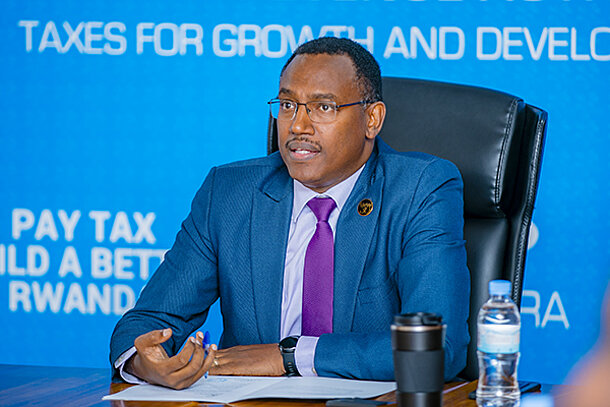
RRA urges American and European Chambers of Commerce to take advantage of voluntary Tax Disclosure Incentives.
Rwanda Revenue Authority (RRA) has urged European and American Chambers of Commerce committees to seize the incentives of voluntary tax disclosure, which allow eligible taxpayers to pay only the principal tax and benefit from the waiver of penalties and interest on disclosed taxes.
On Tuesday, the 16th of April, 2024, RRA Deputy Commissioner General Jean-Louis Kaliningondo chaired a meeting with the two Chambers’ committees to discuss Tax Voluntary Disclosure incentives aimed at raising tax compliance levels.
Starting from the 22nd of March until the 22nd of June 2024, eligible taxpayers can disclose undeclared income or taxes for the period prior to the fiscal year 2023.
Kaliningondo emphasized the need for taxpayers to seize this one-time, three-month opportunity to correct any errors or omissions they may have previously made and come out clean.
“As you know, there's a catch: those who respond positively to this call to come and disclose in the first month will benefit more than those who wait. If you disclose any unpaid tax in the first month, you will have the advantage of depositing a down payment of 50% of the amount of taxes due and have five monthly installments to purge the remaining tax arrears,” he said.
“And if you do so in the second month, you will have only three months subsequently. If you do that in the third month, which is the last month, you will be able to pay only in two installments: 50% at the disclosure point, then the subsequent month, 30 days later, you must have paid the second installment of 50%,” he added.
The first month here corresponds to the period from the 22nd of March to 22nd of April. So, we are still in the first month. The second month runs from the 23rd of April to 22nd of May, and the third month from the 23rd of May to 22nd of June.
Kaliningondo said Rwanda has embarked very actively on an exchange of information program, and in August 2021, signed the multilateral convention for mutual administrative assistance in tax matters (MAAC) and ratified it.
Additionally, Rwanda is in the process of being assessed by the OECD Global Forum to determine compliance with the exchange of information on the requested standard. Rwanda should have an answer on that before the end of this year.
RRA is also implementing the roadmap to comply with the automatic exchange of information (AEOI) and is committed to fully complying with it by 2025.
“So, it's an incentive for multinational corporations because if there are any hidden taxes somewhere, the EOI may force you to disclose. At that moment, any of those specific companies may find themselves in an unenviable position to have to pay taxes and penalties,” he said.
These incentives cover all taxes except customs duties. Taxpayers who need to voluntarily disclose are supposed to use the system via the RRA website.
Lauren Nkuranga, Board President of the American Chamber of Commerce in Rwanda, commended the initiative.
“I think this is a terrific initiative and one that we want to make sure not only all of our members are aware of, but we can also help communicate this to the broader American and European communities,” she said.
This opportunity has been put in place for taxpayers who have undeclared taxes and want to disclose and pay before being notified for an audit. It is the same for a non-registered taxpayer who voluntarily discloses and pays the due taxes.
It is the same for a taxpayer who voluntarily discloses and pays tax after the limit time for an audit, and any taxpayer who voluntarily discloses and pays tax within the announced period for voluntary disclosure.
Key checks before voluntary disclosure
Businesses are encouraged to perform a self-assessment of due taxes to determine if there are any undeclared taxes.
They can do so by analyzing sales transaction data (EBM and non-EBM), ensuring all transactions are supported by an EBM invoice.
They may also analyze declared sales versus sales reported by EBM, as some taxpayers may have declared less than what they have in EBM, and they should check that to pay the due tax.
They can also analyze stock levels (purchases and sales), details of financial statements submitted, and salaries for local and international employees, as PAYE should be paid here if the source of income is in Rwanda.
They also need to analyze imported services. Goods are excluded because they pass through customs, which are not considered in voluntary disclosure schemes.
Points of analysis also include, but are not limited to, analyzing applied prices for transactions between related multinational entities, transfer pricing, and reviewing withholding taxes, VAT reverse charge, and many more.
